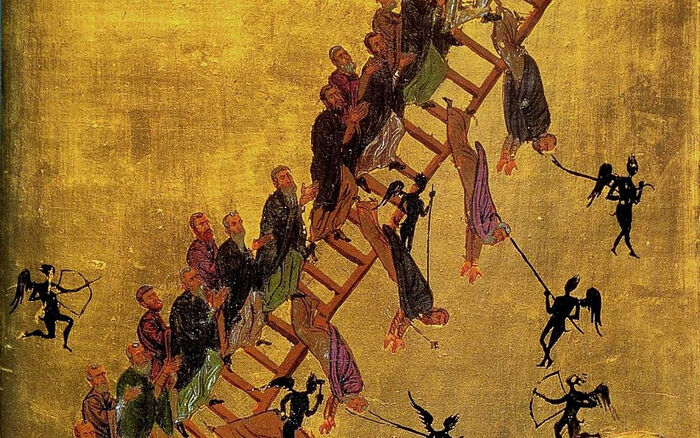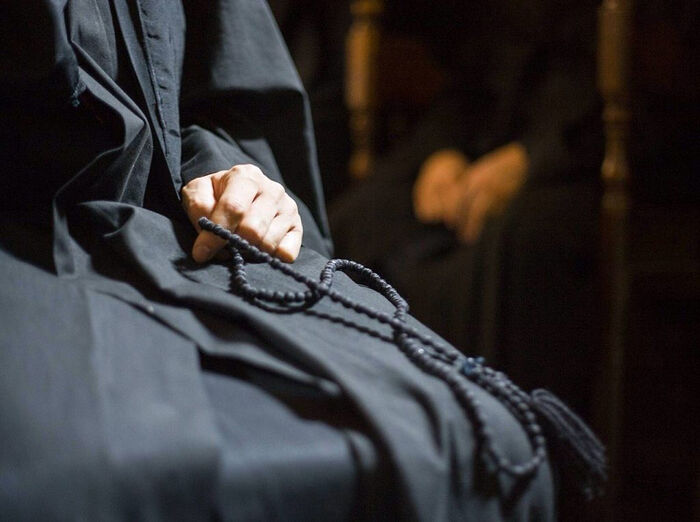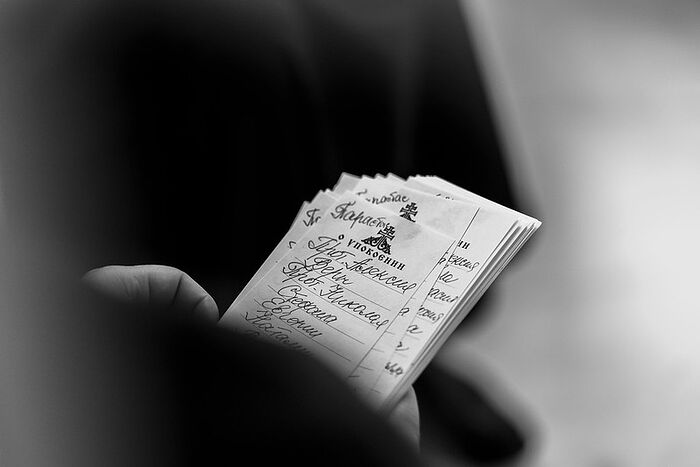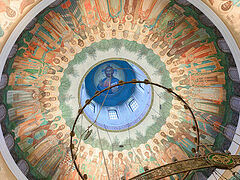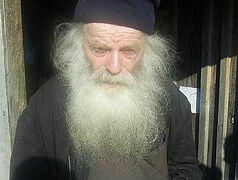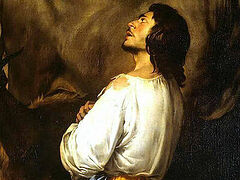Envy ruins a man: both the one who envies and the one who causes it with his boasting and pride. Hieromonk Nikon (Parimanchuk) spoke at one of Sretensky Monastery’s pastoral meetings about how this passion is born and how to fight against it, as well as on other spiritual matters.
—If someone envies you, what can you do to not be affected by their envy?
—We often cause envy by some kind of excessive bragging, by displaying some kind of superiority that doesn’t really exist. What kind of superiority could we possibly have? Only over sin. But if a man has conquered sin, he doesn’t brag about it—he’s already above that; he’s already conquered vainglory. And often we ourselves are the cause of such common envy, when we flaunt some achievement—a vanity fair, as one British author called it. So let’s be more prudent and modest, then we won’t be affected by someone else’s envy, or by someone else’s opinion in general.
—When something good happens in the lives of our friends or relatives—they get a raise, they get married, they graduate from school—it makes me feel uneasy. How should I handle this?
—This is called envy. The Holy Fathers say that envy is the sadness of the heart over the well-being of another. Envy can be defeated by calling on the name of God, saying: “Glory to God, at least someone’s doing well,” and thus we gradually learn to take joy from someone else’s joy. Often, we don’t even know that we’re being envious. But envy will come—it turns out that we’re very lowly people, and we don’t like it when something goes well for someone else. See how sinful we are? Sin exposes our weakness, and we must fight against it with God’s help. This is what we should do in everything, including in the battle with sin: “Lord, help me.” In our evening prayers, we entreat: “O Lord, grant me good thoughts”—we can’t even have good thoughts without the Lord. Everyone is caught up in the hustle and bustle, taking care of the mundane things that constantly come up, but we don’t think about the eternal.
—Sometimes you can feel like you’ve simply stalled out: You go to church, you receive Communion, but there’s no growth—everything’s frozen. What do you recommend we do?
—Keep going to church, keep praying, without changing your rule. It’s our job to work on ourselves. Why are we so sure that after some period of time we’ll achieve spiritual growth and we’ll see spiritual fruits? Take the example of St. Mary of Egypt: She had the desire to correct her life, to change from a sinner to a saint, and she went into the desert. But she still spent seventeen years battling her thoughts and desires, memories of succulent food, of free living. But there was no one standing over her, nothing fencing her in, no bosses restraining her, whether spiritual or secular. She voluntarily stayed in the desert and struggled with sin like it was a wild beast. And we can’t guarantee that by doing some spiritual exercises, by praying, by receiving the Sacraments we’ll achieve some kind of growth. Perhaps, on the contrary, the more we see our sins, the better our growth. After all, in the prayer of St. Ephraim of Syria, which we pray many times a day during Great Lent, we ask to see not our virtues, but our sins, so as to correct them. And the Lord said that when we have done everything, we shouldn’t say: “Lord, see, we’ve done everything,” but instead: “Lord, we have done everything we were supposed to do, as unworthy and lazy servants.”
Gifts for spiritual labors are given only to those who actually carry out spiritual labors. Remember when Motovilov, a spiritual disciple of St. Seraphim of Sarov, asked him: “Batiushka, why are there no saints now like there were in antiquity?” And he told him it’s because there’s no determination. Correction and the spiritual life consist not only in acknowledging one’s sins, although this is the first, important step, but also in correcting them: Those who were greedy should become generous; those who were envious should become welcoming, benevolent; those who were lascivious should become temperate; those who condemned should hold their tongue, but that’s very difficult. We feel like these are such good deeds, and we’re going to start doing them now and that everything will work out, but it doesn’t. And every day begins as if from scratch, again with morning prayers, as if we haven’t read anything and we haven’t even started working.
We don’t have to wait for some spiritual states, but only desire to see our sins. We won’t see them beautifully written out, like a restaurant menu, but we’ll see them in ourselves; they will come out of us. The spirit of condemnation, malice, hostility to everything, and many other sins... The Holy Fathers say in the Paterikons: When you see a novice ascending to Heaven, pull his leg and bring him back to Earth so he doesn’t ascend too high and start thinking he’s already achieved something. One nun asked Elder Ambrose in a letter: "Batiushka, how come I sometimes feel a state of compunction and silence in my soul after Communion and sometimes I don’t? What causes this?” The Elder replied: “It all depends on the grace of God. Our job is to work on ourselves.” Often, we are unworthy of what we have received, of the encounter we have had with God. We shouldn’t be confounded, but let us rather work on repentance and our correction, whether it’s a fasting time or not.
—How does a person know when they’re ready for marriage?
—You should ask the married clergy about this. In general, marriage and family life are a great responsibility, for life, like your promise of fidelity to God at Baptism. Family life is a very big and decisive step, and both parties bear responsibility for it. Many times, people get married, but the value of this doesn’t immediately hit them. We have to value what we have. We look for some other happiness, but we’re Christians, and we should be happy. At every Liturgy, we sing: “Blessed are the merciful, blessed are those who hunger and thirst after righteousness”—that is, they’re happy. “Blessed (happy) are the peacemakers, blessed are the meek, those who mourn”—but we forget about this. It’s the same in family life. Of course, it’s a difficult, heavy cross, but it should be one cross for two, borne together, and not one cross for each person.
Anything that’s done with responsibility is very difficult. You have to pray. The Lord arranges human marriage. I like the words of a certain literary heroine: “A woman seeks a groom, but God gives a husband.”
—Please explain what it means when the Gospel says: Can ye be baptized with the baptism that I am baptized with? (Mk. 10:38).
—Metropolitan Anthony of Sourozh has this thought: Although the Apostles were with Christ the Savior and they saw His miracles, and were called by Him to the apostolate, they didn’t yet have the grace of the Holy Spirit. And therefore, when the Lord was betrayed, they were frightened, they all fled. They couldn’t unite themselves or bring Judas back to their circle and help him stay in repentance and faithfulness to Christ with their love. But this is Metropolitan Anthony’s personal opinion.
We often see that around righteous people there are unrighteous, sinful people, like Christ and Judas, who betrayed Him. We have not yet been visited by the grace of the Holy Spirit. We pray: “Come and abide in us…” but we don’t have the constancy, the inner fire, the determination to be baptized with that Baptism with which the Apostles were baptized after the day of Pentecost. They didn’t just receive Baptism—they ascended the cross that the Lord gave them—to be preachers of the word of God. And every one of us has his own cross that is given to us. In the Sacrament of Baptism, we renounce satan and all his works; we renounce sin. We renounced it, but we aren’t determined enough, and we shelve our determination and it becomes weaker and withers away. To be baptized with the baptism with which the Lord was baptized means to traverse the entire path from start to finish, from His Nativity in this world, unwelcoming to Him, to the Cross. To be baptized with such a baptism means to follow what we all know; it remains only to fulfill it all, but there are few who do. Let us repent and work, dear brothers and sisters.
—They say it’s a mortal sin to have the names of people who don’t go to church and don’t commune commemorated at the Liturgy, because the particles of prosphora are put for them into the Blood of Christ.
—There’s nothing in the Holy Fathers about that. A mortal sin is an unrepentant sin, whether it’s fornication or candy that I stole from a store. An unrepentant sin is when we don’t even regret what we’ve done. When the communion of the people of God is done, the priest enters the altar with the chalice and the particles that were taken out during Proskomedia are put in the chalice with the words: “By thy precious Blood, O Lord, wash away the sins of those here commemorated, through the intercessions of Thy saints.” It doesn’t say which sins. Maybe it’s that someone was distracted during prayer, or maybe something else. The Lord came for everyone and broke His Body for us.
—In my prayers, I commemorate people whom I didn’t really know very well. Perhaps they’re not even alive anymore. My question is: Time has passed, so how should I commemorate them?
—You know how it’s said: I am the God of Abraham, and the God of Isaac, and the God of Jacob. God is not the God of the dead, but of the living (Mt. 22:32). That’s the first thing. Second, I also have some names of people whom I don’t know. I pray for them; I commemorate them. And you know, sometimes I hear something about them, that they’re alive and well or that they died. St. Alexei of Zosima Skete said that when you’re asked to pray for someone, and it’s not a relative or someone you know well, you should pray for them for four months. Then they might not need the same prayerful assistance anymore. You know, they brought someone to the ICU, they stayed there for a while, then they were transferred to the general ward, and then they were discharged. Otherwise, your book of commemorations will just grow and grow.
—When is the best time to read the Psalter? Whenever it’s convenient, when you have the strength?
—When it’s convenient, yes. For me, for instance, it’s more convenient in the morning, because then I have things to do all day. Time doesn’t seem to go so fast in the morning, up to 9 or 10, but then, in the blink of an eye, it’s already evening and you’re getting tired.
—Can you read at night?
—You can. Basically, it’s just good to read the Psalter yourself, at least one psalm if an entire kathisma is too difficult. And over time, as we read the Psalter, we will suddenly realize: “So that’s what we need. That’s what we were looking for. These are the words of consolation that will support us, calm us down, and bring us to reason.” And at the end of each kathisma there are also troparia and prayers that the person prays for himself: The first “Glory” is for health, the second is for repose, and the third is to pray for yourself as a sinner.
It’s pretty rare for a child to fall in love with reading Divine Scripture and prayers from infancy. For the most part, we gradually acquire the habit and we as if discover the spiritual beauty. The Psalter is real spiritual poetry; there are very beautiful poetic images there. We can only marvel at how David, who not only had no literary education, but mostly engaged in military affairs, still managed to author such spiritual verses, sighs, complaints, lamentations, joys. It’s the most popular book from the Old Testament, the most read.
—Are we allowed to have Unction several times a year?
—The Sacrament of Unction is usually served once a year, during Great Lent. This tradition began at the beginning of the twentieth century. Before that, Unction was served only for the sick. But since we’re all sick not only in body but also in soul, and the Unction prayers are read not only for the healing of the soul but also for deliverance from sins both remembered and forgotten, now Unction is recommended for all. In rare cases, when there’s some kind of serious illness and spiritual support is needed, then you can receive Unction during every fast.

